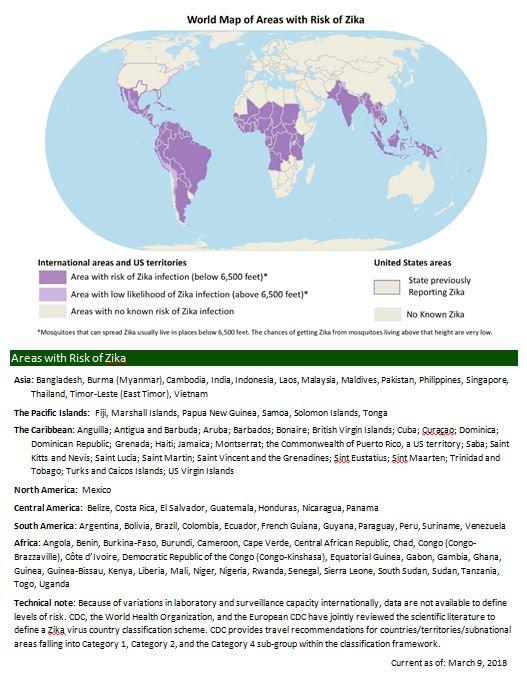PREG Resources
Zika Virus Information
What is the Zika Virus?
- Zika is a virus that is transmitted by mosquitoes. It was identified in humans in 1956 in Africa, but has since spread and become common in South America, Latin America, Caribbean, and Pacific countries.
- Most people (80%) who contract Zika usually have no symptoms. The most common symptoms are fever, rash, joint pain and muscle aches, and red eyes, other symptoms include headache, retro-orbital pain, edema, vomiting. Symptoms develop from 3-12 days after being infected and last from several days to a week.
How is Zika transmitted?
- Zika is transmitted through the bite of mosquitoes that live in warm climates. Transmission from mosquitoes has occurred throughout South America, Latin America (including Mexico), all of the Caribbean countries, and Pacific island countries.
- Zika has also been identified in the semen of men who have been infected and is noted to persist for weeks to months in semen. Zika virus also is found in other body fluids such as saliva and urine, and can be detected in these fluids even after it is no longer detectable in blood.
- Sexual transmission of Zika virus has been reported, including male-to-female and female-to-male transmission, when the sexual contact did not include a barrier to protect against infection, but the frequency and efficiency of this route of infection is uncertain. Barriers against infection include male or female condoms for vaginal sex, male condoms for oral sex, and male condoms cut to create a flat barrier or dental dams for oral sex. Additional studies are needed to characterize the risk of sexual transmission of Zika virus and recommendations will be updated.
- Non-sexual transmission has also occurred from an elderly person to their care-giver in Utah.
Why is everyone concerned?
- Zika can be passed from a mother to her fetus during pregnancy. Infection with Zika during pregnancy is linked to birth defects (microcephaly (small heads) and other neurological abnormalities in babies. Zika infection may be associated with Guillain-Barre syndrome.
- There is no specific therapy or vaccine to prevent Zika, or medicine to treat Zika. (Vaccine trials are underway). Treatment is supportive. For mild disease, symptoms can be alleviated with analgesics and antipyretics.
- Zika can also be transmitted from a man to his sex partners.
Who is at risk of getting Zika?
- Anyone traveling to the affected areas are at risk of contracting it. A woman can also contract Zika by having intercourse with a man who traveled to the affected countries.
How can I prevent contracting Zika?
- The best protection is to prevent mosquito bites.
- Clothing: Wear long sleeved shirts and pants. Treat clothing with permethrin sprays. These are treatments for clothing only and should not be applied to skin.
- Indoor protection: Stay in places with air conditioning or that use window/door screens
- Repellent: Use EPA-registered repellents containing DEET. When used as directed, these are safe and effective for pregnant women. Follow the label instructions and reapply as directed. If using sunscreen also, apply the sunscreen before applying insect repellent.
What is not known about Zika?
- If there is a safe time during pregnancy to travel to an area with Zika
- If you are pregnant and contract Zika, how likely it is that the virus will infect your fetus and if your baby will have birth defects from the infection
- How long the virus may remain in the semen of men after infection.
What if I am already pregnant?
- Avoid travel to areas affected by the Zika virus unless absolutely necessary. If travel is necessary, use long sleeve/pant clothing and mosquito repellent during daytime and night time hours.
- If a male sexual partner must travel to or lives in Zika affected area: It is recommended that he also use prevention steps above and use condoms or abstain from intercourse for the duration of the pregnancy, even if he did not develop any symptoms.
- Let your OB know about your possible exposures to zika. Guidelines for testing and screening have been developed by the American College of Obstetricians and Gynecologists (ACOG).
What if I am trying to get pregnant?
- If traveling to an affected area, it is recommended that women not attempt to conceive during their travel and for 2 months after their return. After this, they can resume attempts to conceive.∙
- For women with a male partner who has traveled to an area with Zika virus, it is recommended that pregnancy be avoided and condoms used for 3 months after his return whether he was symptomatic or not.
In the last interim guidance in October 2016, CDC recommended that men with possible Zika virus exposure wait at least 6 months after symptom onset (if symptomatic) or their last possible Zika virus exposure (if asymptomatic) before trying to conceive with their partner. New data published since then support an update to that interim guidance including that among the currently available reports of sexual transmission of Zika virus, the longest period from symptom onset in the index case to potential sexual transmission to a partner was between 32–41 days; most reports indicate much shorter intervals. The longest period after symptom onset at which replication-competent (i.e., potentially infectious) virus has been detected in semen by culture or cytopathic effect was 69 days. No other studies reported potentially infectious Zika virus in semen specimens obtained ≥40 days after symptom onset. CDC’s last interim guidance released in October 2016 was based on the maximum duration of detection of Zika virus RNA in semen. CDC now recommends that men with possible Zika virus exposure who are planning to conceive with their partner wait for at least 3 months after symptom onset (if symptomatic) or their last possible Zika virus exposure (if asymptomatic) before engaging in unprotected sex. CDC now also recommends that for couples who are not trying to conceive, men can consider using condoms or abstaining from sex for at least 3 months after symptom onset (if symptomatic) or their last possible Zika virus exposure (if asymptomatic) to minimize their risk for sexual transmission of Zika virus. Recommendations for men with possible Zika virus exposure whose partner is pregnant remain unchanged; these couples should be advised to consistently and correctly use condoms during sex or abstain from sex for the duration of the pregnancy.
Who should be tested for Zika virus?
- According to ASRM (American Society of Reproductive Medicine), women and men with possible exposure to Zika virus but without clinical illness consistent with Zika virus disease should consider testing for Zika viral RNA within 2 weeks of suspected exposure and wait at least 8 weeks after the last date of exposure before being re-tested. They then should consider attempting pregnancy only if the test is negative.
- Non-pregnant women and all men with Zika virus exposure and symptoms consistent with Zika virus should be tested.
Disclaimer: Data involving Zika, its transmission and infectivity, and its adverse effects on fetuses and adults is changing daily. Any guidance published today may not be accurate for counseling and treatment of individuals tomorrow.



